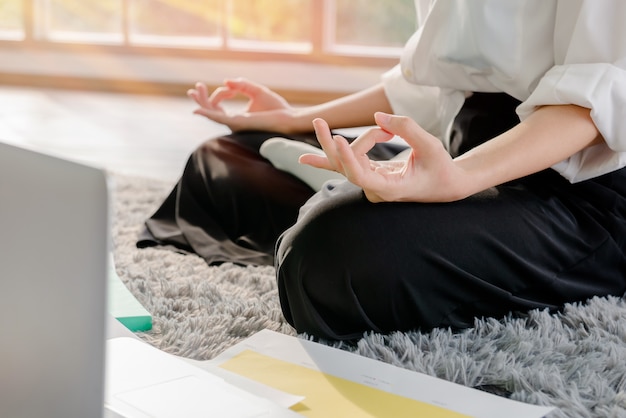Are you feeling overwhelmed by the pressure of modern life? As a man navigating the complexities of career, relationships, and personal expectations, I’ve come to realize that stress is an all-too-common companion. In today’s fast-paced world, the weight of responsibilities can feel crushing, leaving us yearning for a moment of peace.
This is where mindfulness and meditation emerge as beacons of hope. Embracing these practices can transform our mental landscape, offering profound relief amidst chaos. Guided meditation for stress relief, in particular, provides a structured path toward serenity, allowing us to disconnect from the noise and reconnect with our inner selves.
By exploring the benefits of this approach, we not only gain valuable tools to combat stress but also cultivate resilience. Join me as we delve into the transformative power of guided meditation and discover how it can enhance our lives.
Understanding Mindfulness and Meditation
Mindfulness is the practice of being fully present and engaged in the moment, without judgment or distraction. It involves an awareness of thoughts, feelings, and surroundings, cultivating a deeper connection to one’s experiences. Meditation, on the other hand, is a broader practice that often incorporates mindfulness techniques. It typically involves focusing the mind and eliminating distractions through various methods, including breathwork, visualization, or body scans. Together, these practices play a significant role in male wellness.
For men, embracing mindfulness and meditation can lead to enhanced emotional resilience, better stress management, and improved mental clarity. In a world where societal pressures often dictate responses, these practices help in creating a sanctuary of calmness. This is essential for promoting mental health and overall well-being, allowing men to navigate life’s challenges with a more balanced perspective.
Moreover, guided meditation for stress relief specifically tailors the meditation experience, providing structured support and guidance. This can be particularly beneficial for men who may struggle to initiate or maintain meditation practices on their own. By harnessing mindfulness and guided techniques, men can effectively reduce stress, enhance concentration, and foster a greater sense of fulfillment in their daily lives.
The Science Behind Stress Relief
Benefits of Guided Meditation

Another significant benefit is the enhancement of self-awareness. Guided sessions provide structured encouragement to reflect on thoughts and emotions, allowing practitioners to better understand their inner landscape. This process can lead to improved emotional regulation, fostering resilience in the face of daily challenges.
Additionally, guided meditation can improve concentration and attention span. As individuals practice staying present during sessions, they build skills that translate into increased focus in everyday tasks. This heightened attention also aids in decision-making, as it allows for clearer evaluations of situations based on rational thinking rather than emotional reactions.
Moreover, guided meditation promotes a sense of connection, reducing feelings of isolation often associated with stress. Participants frequently report a feeling of belonging within the larger community of mindfulness practitioners, which can enhance social support and strengthen relationships. This interconnectedness can significantly amplify the overall experience of stress relief, making guided meditation a powerful tool in the quest for mental wellness.
How to Start Guided Meditation
Additionally, be consistent with your timing. Select a specific time each day, whether it’s morning, midday, or evening, creating a routine that signals your mind to enter relaxation mode. As you listen to the guidance, focus on your breath, letting go of distractions and embracing the present moment.
Importantly, remain patient with yourself. The journey may have ups and downs, but commitment will yield results over time. Lastly, consider journaling your experiences post-session. This reflection not only reinforces your progress but also helps identify patterns in your stress and awareness, enhancing your mindfulness practice.
Tips for a Successful Meditation Practice
Establishing a successful meditation practice hinges on consistency and the right environment. Begin by setting aside a specific time each day dedicated solely to your practice. Whether it’s early morning or late evening, creating a routine helps signal to your mind that it’s time to unwind.
Choose a quiet space where you feel comfortable and undisturbed. This sanctuary should be free from distractions, allowing you to dive into your meditation fully. Consider adding calming elements, such as soft lighting or soothing scents, to enhance your experience.
Start with short sessions, gradually increasing the duration as you become more comfortable. This approach prevents overwhelm and reinforces a positive association with your practice.
Utilizing guided meditation resources can also provide structure and direction. With many options available, find one that resonates with your specific needs for stress relief, ensuring a personalized practice.
Finally, remember to be kind to yourself. Some days may be easier than others, and that’s perfectly normal. Embracing this journey with patience will ultimately lead to a more fulfilling meditation practice.
Frequently Asked Questions about Meditation Practice
- What is the best time of day to meditate?
- The best time to meditate varies from person to person. Some find mornings ideal for setting a positive tone for the day, while others prefer evenings to unwind and reflect.
- How do I create a distraction-free meditation space?
- To create a distraction-free space, choose a quiet room, eliminate external noises, and keep the area tidy. Adding calming elements like cushions, soft lighting, and soothing scents can enhance the environment.
- How long should I meditate when starting?
- When starting, aim for 5 to 10 minutes. Gradually increase the duration as you become more comfortable with the practice.
- Are guided meditations effective for beginners?
- Yes, guided meditations are highly effective for beginners. They provide structure and can help you focus, making it easier to get started.
- What should I do if I can’t focus during meditation?
- If you find it hard to focus, acknowledge those thoughts without judgment and gently return your attention to your breath or the guided instructions. Consistency will improve your focus over time.





